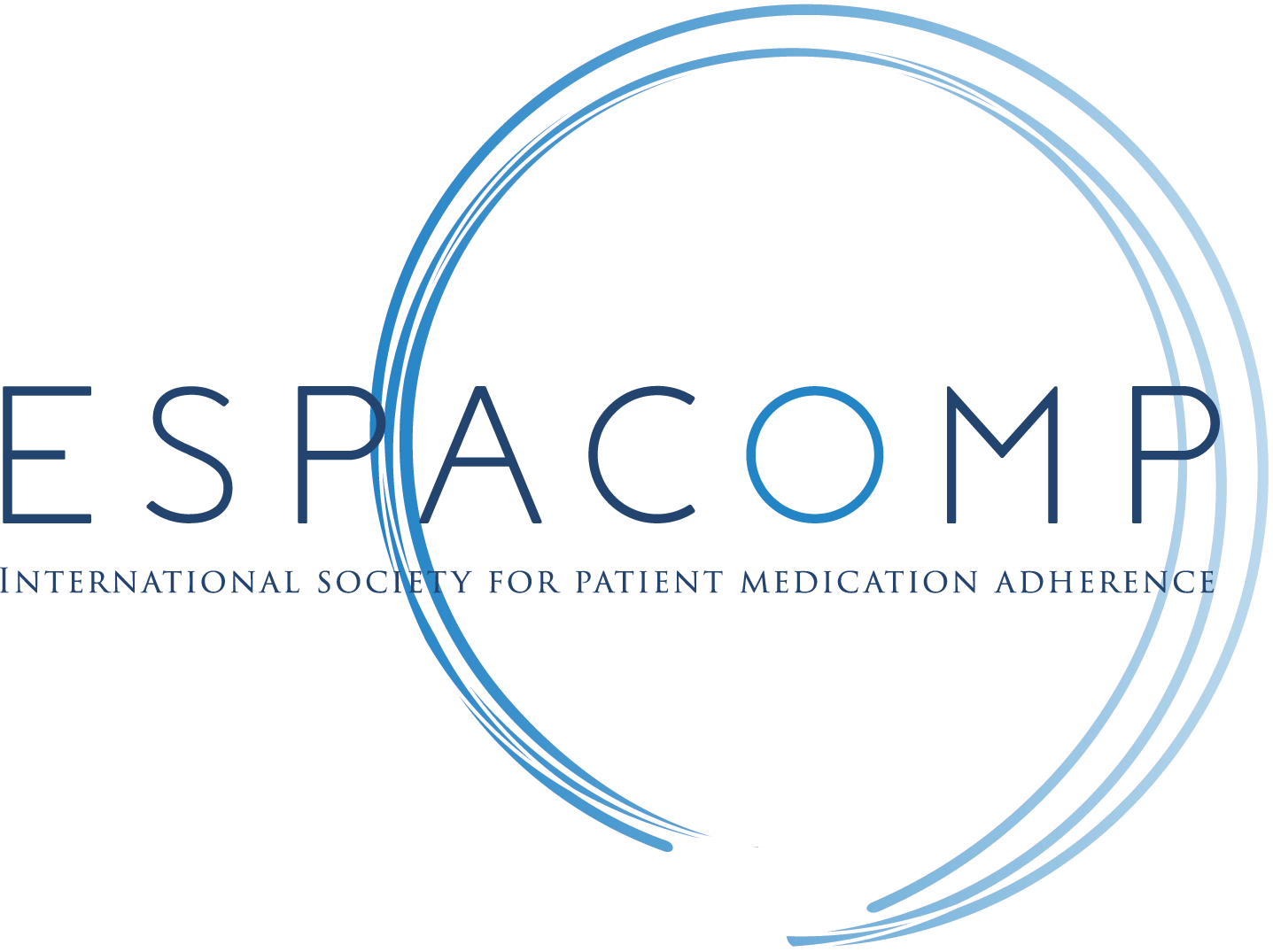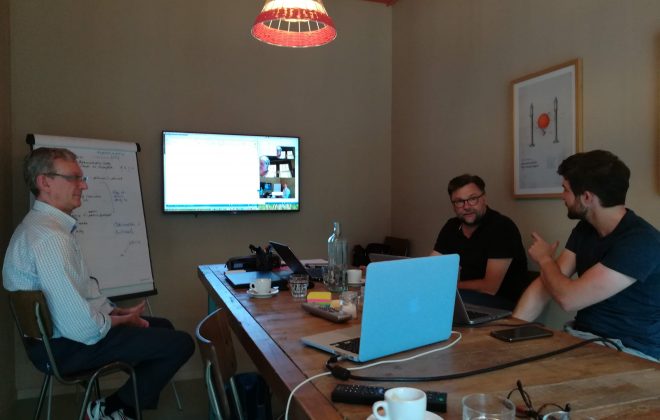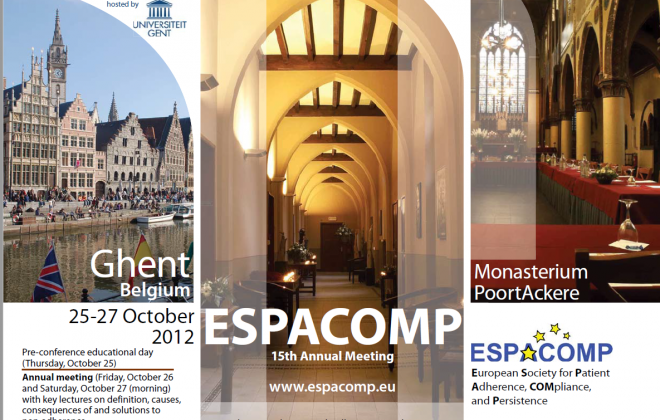ESPACOMP 2010
ESPACOMP 2010
The 14th European Symposium on Patient Adherence, COMpliance and Persistence was held on September 17th – 18th, 2010 in Lodz, Poland.
Program
DAY1 – September 17th
09:00-09:15 Welcome and Introduction.
09:15-10:00 Jean-Michel Métry Memorial Lecture.
Improvement of drug adherence using single pill combinations: what is the evidence?
Michel Burnier, Service of Nephrology and Hypertension, CHUV, Lausanne, Switzerland.
10:00-11:30 Session 1: What’s new in direct measurement of adherence
Measuring, Managing and Improving Adherence.
Aunia Grogan, Global Head of Adherence, Novartis, Switzerland.
Contributed papers
Adaptive analysis of electronic medication adherence data for african-american patients with hypertension.
Antoinette Schoenthaler, George Knafl, Gbenga Ogedegbe, Center for Healthful Behavior Change Department of Medicine NYU School of Medicine New York, USA.
Intervention and control care determines adherence intervention effects among patients treated for HIV: A meta-analysis of randomized controlled trials.
Marijn de Bruin, Herman Schaalma, Gerjo Kok, Charles Abraham, Harm J Hospers, (Assistant profession Intervention Design&Behavior Change) Department of Communication Science, Wageningen University, the Netherlands.
The growing market of adherence technologies. The challenges and implications of implementing electronic medication reminders.
Pernille Dam, Hanne Herborg, Marianne Agergaard, Claus Møldrup, Charlotte Rossing, Pharmakon, Danish College of Pharmacy Practice.
11:30-12:00 Break&Posters.
12:00-13:30 Session 2 : Use of electronic monitoring of drug intake to promote adherence.
Improving adherence and treatment decision-making: the power of electronically compiled drug-dosing histories.
Marijn de Bruin, (Assistant profession Intervention Design&Behavior Change) Department of Communication Science, Wageningen University, the Netherlands.
Contributed papers
Persistence and execution to oral anticancer medications.
Marie Paule Schneider, Leila Achtari Jeanneret , Silvia Domingues, Anne-Catherine Lange, Bernard Vrijens, François Lüthi, Olivier Bugnon, Community pharmacy, Department of ambulatory care&community medicine, University of Lausanne, Switzerland.
Large scale monitoring program for hypertensive patients in a romanian community pharmacy chain. Ana Maria Petculescu, Diana Simona Negru, S.C. S.I.E.P.C.O.F.A.R. S.A, Bucharest, Romania.
Compliance to phosphate binders: a nurse’ lead intervention made difference.
Monique M. Elseviers, Yoleen Van Camp, Sofie Huybrechts, Department of Nursing Sciences, University of Antwerpen, Antwerp, Belgium.
13:30-14:30 Lunch&Posters.
14:30-15:40 Session 3 : Use of e-health and telemedicine to improve adherence.
eHealth in Europe: need, vision and practice.
Pepijn van de Ven, Wireless Access Research Centre, Department of Electronic and Computer Engineering, University of Limerick, Ireland.
Contributed papers
Real-time Adherence data as input to an ICT based system for the treatment of depression.
Eric Tousset, Pim Cuijpers, Mark Hoogendoorn, Michel Klein, Aardex Group, Vise, Belgium.
Real time medication monitoring with sms reminders improves adherence to oral antidiabetic medication in patients with suboptimal adherence.
Marcia Vervloet, Liset van Dijk, Arno Wormgoor, Jacqueline Santen-Reestman, Dinny de Bakker, Marcel Bouvy, NIVEL, Netherlands Institute for Health Services Research, Utrecht, The Netherlands.
15:40-16:00 Break&Posters.
16:00-17:00 Session 4 : Evolution of terminology and taxonomy of adherence in English and the other languages, and medical practices.
Contributed papers
A simple, robust taxonomy to describe deviations from prescribed drug therapy.
Bernard Vrijens, For the ABC Project Team, AARDEX Group, Sion, Switzerland and Department of Biostatistics and Medical Informatics, University of Liège, Belgium.
Evolution of meaning and use of ‘observance’ / ‘education thérapeutique’ (‘therapeutic education patient’) versus ‘compliance’ / ‘adherence’ in French and English languages.
Marguerite Cognet, Emilie Adam, Rosane Braud, Researcher, teacher, UFR Social Sciences Université Paris 7 Diderot, Migrations and Society Research Unit (URMIS) Paris, France.
Differences and changes in attitude towards chronic medication between adherent and non-adherent patients.
Harm Geers, Eibert (Rob) Heerdink, Marcel Bouvy, Utrecht University, Faculty of Science Utrecht Institute for Pharmaceutical Sciences Division of Pharmacoepidemiology & Pharmacotherapy Utrecht, the Netherlands.
17:00-18:30 Meeting of the General Assembly at the conference venue.
DAY 2 – September 18th
09:00-09:10 Introduction.
09:10-10:20 Session 5 : Miscellanea 1.
Telemonitoring of Long Term Oxygen Therapy: Air Liquide Experience&Research.
Marc Lemaire, Air Liquide Santé.
Contributed papers
Application of health psychology and behavioural economics to explain adherence to medicines in adult patients: a systematic review of empirical studies.
Emily Fargher, Val Morrison, Todd Ruppar, Dyfrig Hughes, Bangor University, UK.
Mobile phone SMS for optimizing asthma treatment outcome – a controlled trial.
Claus Møldrup, Birthe Søndergaard, Jonathan Stein, University of Copenhagen Faculty of Pharmaceutical Sciences Department of Pharmacology and Pharmacotherapy.
10:20-11:30 Session 6 : Miscellanea 2.
Patient adherence in pre- and post-registration studies: different objectives, different approaches.
Ivo Abraham, University of Arizona, College of Nursing.
Contributed papers
Factors associated with medication adherence among psychiatric outpatients with substance abuse risk.
Stephen Magura, Andrew Rosenblum, Chunki Fong, Western Michigan University.
The heart foundation’s “Improving cardiovascular adherence project”: develoment of an evidence-based training package for health care professionals.
Parisa Aslani, Ines Krass, Beata Bajorek, Jill Thistlethwaite, Jeremy Bunker, Geoffrey Tofler, Faculty of Pharmacy, University of Sydney, Australia.
11:30-12:00 Break&Posters.
12:30-13:50 Session 7 : Miscellanea 3.
To Encourage or Coerce? The law’s role in achieving patient compliance.
Stewart Duffy
Contributed papers
Comparison of real life objective reliable compliance data assessed by an innovative electronic system in patients recruited either by a pharmacist or a general practitioner study: Differences and potential bias.
Eric Leutenegger, Eric Vicaut, Bernard Bousquet, ABR Pharma, Paris; School of Medicine, University of Paris Lariboisière.
The effect of a clinical trial on adherence and persistence to treatment.
Hein A.W. van Onzenoort, Frederique E Menger, Cees Neef, Willem J Verberk, Peter W de Leeuw, Paul-Hugo M van der Kuy, Department of Clinical Pharmacy, Radboud University Nijmegen Medical Centre, Nijmegen, The Netherlands.
Determinants of patient adherence to medical treatment: a systematic review of reviews.
Przemyslaw Kardas, Pawel Lewek, ABC Project Team, Medical University of Lodz, First Department of Family Medicine, Lodz, Poland; ABC Project www.abcproject.eu.
13:50-14:00 Concluding remarks and the future of ESPACOMP.
14:00-15:00 Lunch.
Poster presentation
Impact of prolonged antihypertenive duration of action on predicted clinical outcomes in imperfectly adherent patients: comparison of aliskiren, irbesartan and ramipril.
Adam Lowy, Yvonne Brede, Deborah Keefe.
Assessment of adherence of cinacalcet HCl in dialysed patients.
Valentina Forni, Menno Pruijm, Carole Zweiacker, Michel Burnier.
Evaluation of the medication compliance of liver transplant patients switched from a twice-daily to a once-daily tacrlimus-based regimen.
Marion Eberlin, Irene Kraemer.
Improving patients’ compliance – the role of pharmacists.
Tatjana Crnjanski, Svetlana Stojkov-Rudinski, Ivana Tadic.
Twelve-month persistence of COPD therapy after initiation in patients aged 50 and over: results from the L777 study.
Laurent Laforest, Mélanie Broquet, Gaëlle Désaméricq, Eric Van Ganse.
Role of data-acquisition rate in defining salient patterns of drug exposure in ambulatory pharmacotherapy.
Bernard Vrijens, John Urquhart.
Objective adherence measurement with an electronic blister: a feasibility study in primary care.
Hein A.W. van Onzenoort, Cees Neef, Willem J Verberk, H Peter van Iperen, Peter W de Leeuw, Paul-Hugo M van der Kuy.
Studying the impact of medication counseling for patients starting a treatment with antidepressant drugs: study design.
Sophie Liekens, Tim Smits, Gert Laekeman, Veerle Foulon.
Occurrence of prescriptions for noncurrent – changed or terminated – treatment and prescription duplicates in electronic medical records and the Swedish national prescription repository.
Anders Ekedahl.
Beliefs about medicines predict non-adherence with medication intended for chronic use.
Harm Geers, Eibert (Rob) Heerdink, Marcel Bouvy.
Impact of Drug Reminder Packaging on Compliance ? Where Are the Research Gaps?
Fabienne Boeni, Katja Suter, Isabelle Arnet, Kurt. E. Hersberger.
Medication adherence in patients treated for COPD.
Tamás Ágh, Ágnes Mészáros.
Exploring ethnic differences in patient perspectives on medicines and medicine-taking: a cross-cultural study in New Zealand.
Beata Bajorek, Debbie Bassett-Clarke, Ines Krass.
Achieving INR Target and Patient Satisfaction of Warfarinised Patients in HKL.
Subramaniam Thanimalai, Agnes HSY, Chan BS, Chan CK, Nadrah N.
A nationwide survey on medication adherence among polish patients and healthcare workers.
Wojciech Kuzmierkiewicz.
Involving patients in the development of a group-based educational intervention for a randomised controlled trial to improve adherence to glaucome eye drops.
Heather Waterman, Lisa Brunton, Cliff Richardson, Cecilia Fenerty, Fiona Spencer, David Henson.
Medication Persistence in the Treatment of HIV Infection: A Review of the Literature and Implications for Future Clinical Care and Research.
Jason W. Bae, William Guyer, Kristy Grimm, Frederick L. Altice.
Conference venue: this year’s conference will take place in the interiors of the Poznanski’s Palace – Museum of the City of Lodz.







